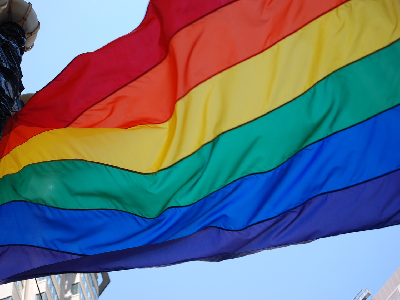Tag Archive for: visibility
By Aimee Hansen
Last year, theglasshammer covered how corporations are taking the unexpected lead role in advocacy for LGBTQ rights, amidst the debasing of governmental protection and condoning of discrimination.
As companies continue to do so – for a multitude of reasons possibly as a direct response to the regressive approach that the Trump administration has taken. The Fenway Institute concludes that, “on balance the Trump Administration has pursued policies that will likely increase discrimination against LGBT people.” This includes repealing non-discrimination regulations that provided protections to LGBT people, encouraging religious refusal discrimination through executive branch actions and “vastly reshaping the federal judicial landscape in a way that is very concerning for LGBT people.” And, in the US, 28 states still lack basic protections in employment (and housing) when it comes sexual orientation and gender identity. Fear and phobia are arguably the central agency of political action and inaction on the LGBTQ front, nationally and internationally. But public opinion around the validity of equal rights for same-sex marriage has never been higher at around 62%.
So, with progressive corporations taking the lead, what does real LGBTQ inclusion look and feel like?
Increased Corporate Adoption of LGBTQ Friendly Policies
In HRC’s Corporate Equality Index 2018 annual assessment of employer’s LGBTQ workplace policies, a record-breaking 609 companies earned perfect scores, up by 18% from 517 last year. 83% of U.S.’s Fortune 500 companies offer clear protections on the basis of sexual orientation and gender identity, an increase from 3% just 15 years ago in protection for gender identity. Over 90% of CEI-rated businesses include both sexual orientation and gender identity employment protections for their U.S. and international operations. The results demonstrate that “business has not waited for a legal mandate to become LGBTQ-inclusive,“according to Beck Bailey, deputy director of the HRC Foundation’s Workplace Equality Program, because it’s both the right thing to do and good business in creating diverse and attractive workplaces. ”They aren’t waiting for federal civil rights laws to change; they’re adopting their own inclusive policies and practices.”
“Good employers don’t simply cut paychecks every two weeks. They have to model good citizenship–not just in words but in actions–in the communities where their LGBTQ employees live and work,” wrote Ineke Mushovic, executive director of the Movement Advancement Project, in Fast Company.
Mushovic urges companies to do four things to advance LGBT rights: push for non-discrimination laws, declare that you’re open to all, fight discriminatory ‘bathroom bills’, and build a more diverse and inclusive workplace.
The Tangibility Gap Between Policies and Practice
OutNEXT/PwC surveyed 231 LGBT+ high performance employees, and 28 corporate leaders among mostly Out Leadership companies, for their report “Out to Succeed: Realising the full potential of LGBT+. The report sought to better understand how organizations can support high-performing LGBT+ employees. The majority of employees and employers agreed that having an openly supportive focus on LGBT inclusion has given the organizations wider access to the best talent and improved the organization’s place in the market. Additionally, 60% of employees believed that “being out at work has improved their ability to do business and engage with customers.” The report also noted some gaps between employers and employees, and gaps between the existence of policies in companies and whether LGBT+ employees experienced them as being present, visible and realized.
99% of employees indicated “reputation as a fair and equal employer (e.g., known for being LGBT+ friendly)” as important to making a company attractive as an employer. Only 57% of employers saw this as a key factor, a clear gap. Also according to the report, “Nearly 90% of employees believe that visible LGBT+ leaders within a company are important, though a high proportion of organizations don’t have senior LGBT+ leaders who are visible.” The report authors also shared that “while employees valued both inclusive action focused on recruitment and career progression, many were unaware even when companies claimed to have these programs.”
Only 35% of employees were aware that their companies had programs focused on recruiting LGBT+ employees, though 60% of businesses claimed to have them. And “while nearly 60% of employers take steps to create a pathway to senior management for LGBT+ people, only around 40% of employees believe this is the case.”
Further, about 40% believed that their organizations weren’t doing enough to encourage LGBT+ diversity. Over a third felt that despite the talk, opportunities weren’t really equal for all. The authors note, “It’s telling that nearly 40% of employers agree.”
OutNEXT/PwC found that over 80% of these “high-performing, high potential developing leaders” felt comfortable being out at work, yet more than half knew junior colleagues or even peers that were not out.
Stonewall found that in Britain, 35% of LGBT+ employees still hide their identity out of fear of discrimination. According to Psychology Today, “Two in five LGBT workers (40 percent) report feeling bullied at work.”
“For too many LGBT+ employees, many organisations still feel closeted. This hinders not only the organisations in recruiting and retention, but, more importantly, this hinders the careers of LGBT+ professionals,” says Bob Moritz, Global Chairman, PwC. “All of us need to create inclusive environments where LGBT+ talent can feel safe, free to be their true selves, and fully participate in the workplace.”
The Importance of Being Visible & Valued, Not Just Accepted
In its third year and with an active alumni network, Stanford’s LGBTQ Executive Leadership Program supports experienced applicants to catapult their careers into the C-Suite. The week-long program offers, among other benefits, to help participants learn the influences of their LGBTQ identity on their leadership style and how to become a more authentic leader (or be their ‘genuine self’).
“I’ve always been out at work, but I think Stanford helped me to embrace the idea of not just being out, but being visible,” said Beth Parker, public relations director at PwC in Washington, D.C. “It was transformative for me because it was sort of an awakening. I became keenly aware of the responsibility that I have to other people in the LGBTQ community,” said Parker. “It made me want to mentor people, it made me want to lead more in that space and be more visible.” Other alumni have also shared how the program encouraged them to stop trying to be heteronormative and to speak out visibly about issues of sexual identity in the workplace. Set against a political backdrop of dismissal of rights and encouragement of discrimination, the real bar of inclusion isn’t just acceptance. It’s cultivating a culture which allows LGBTQ individuals to show up as our whole selves at work, not feeling the need to pass or cover. It’s feeling invited, visible and valued, and to see it play out in our leaders and in our opportunities.
Companies can more demonstrably show LGBTQ employees what inclusion really looks and feels like. LGBTQ leaders and individuals can more visibly claim their inclusion.
 Visibility matters in your career.
Visibility matters in your career.
It is important for bosses, sponsors and even peers to know what you are capable of and see what projects you are working on. Externally it is good to be seen by people in other firms too as although you might choose to be a “lifer” in one firm, you may also one day look for a change. Building a network is crucial to a career that is broad and long as people drive processes and innovate new products.
For eleven years here at theglasshammer.com we have profiled a senior woman on a Monday in our Voice of Experience column and on some Thursdays we profile Mover and Shakers and Rising Stars. We also have addressed intersectionality since the beginning, making sure in our profiles, interviews and panel events that all types of women are visible.
We have written over 800 profiles in total and we have not finished yet so as we look ahead for the rest of 2018, we are looking for great women to profile in financial and professional services and Fortune 1000 companies for the rest of the year. Thematically. we are looking for LGBTQIA Leaders for our June Pride series and then Men who Get it for July and then Latina leaders for September.
Please apply to louise@theglasshammer.com if you wish to be considered as a “profilee”.
We do not cover entrepreneurs for one reason that we have had in place from the beginning and that is because women are often encouraged to leave big business. Our site has always been about navigating your career inside industries (money, oil, big law) that have formal and also implicit male structures and hierarchies
The Glass Hammer
Executive coaching, leadership development coaching and career navigation coaching for women looking to develop, advance and lead in top roles.


